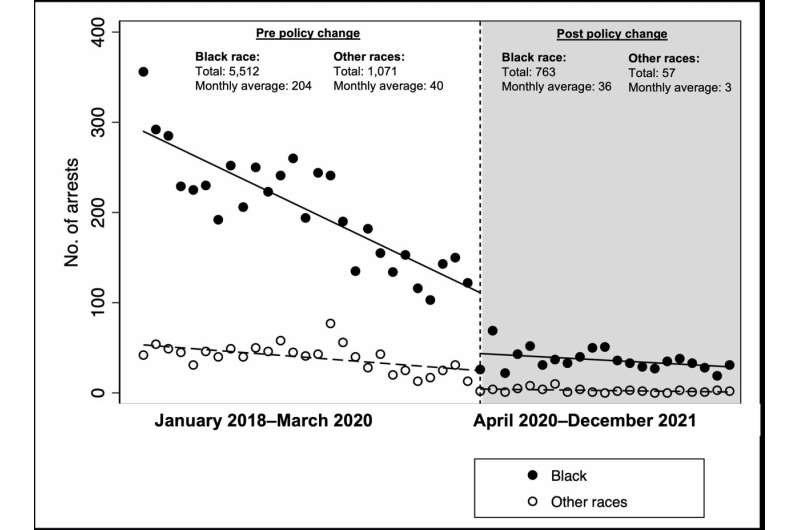This article has been reviewed according to Science X's editorial process and policies. Editors have highlighted the following attributes while ensuring the content's credibility:
fact-checked
peer-reviewed publication
trusted source
proofread
Study: De facto decriminalization of drug possession reduces the overall arrest toll on the Black community

De facto decriminalization of drug possession may be a good first step in addressing the disproportionate impact of an overburdened United States criminal justice system on the Black community.
According to a new study in the American Journal of Preventive Medicine, this strategy was associated with significant and sustained reductions in low-level arrests. These arrests too often prevent drug users from obtaining needed treatments and services. The findings also suggest that while these policies may effectively reduce the overall arrest toll, striking disparities persist in how police are applying the directives across racial lines—gaps the investigators suggest must be effectively addressed.
The United States incarcerates more of its population than any other nation. Despite similar levels of drug use across the population, the policing and criminal prosecution of drug possession are disproportionately concentrated in Black and low-income communities and have been a key driver of racial disparities within jails and prisons.
While some states and localities have passed decriminalization legislation, many jurisdictions are using prosecutorial discretion to enact de facto decriminalization to divert low-level drug users away from prisons, where they are likely to experience poor health outcomes.
Lead investigator Saba Rouhani, Ph.D., MSc, Assistant Professor in the Department of Epidemiology at the New York University School of Global Public Health and core faculty at the school's new Center for Anti-racism, Social Justice and Public Health explained, "We conducted this research because we wanted to examine whether this kind of directive could impact racial disparities in the criminal legal system in Baltimore, a majority Black city with a heavy burden of substance use and racialized policing."
Investigators analyzed arrest trends from January 2018 to December 2021, before and after a de facto decriminalization policy went into effect in Baltimore. They found that following the policy change in April 2020, there was a significant reduction in low-level drug-related arrests, which continued to decline over time.
The vast majority (82%) of the decline occurred in the Black community. While this illustrates a sizable net reduction in drug arrests among Black residents, they also found that the ratio of street arrests in Black compared to non-Black individuals actually increased from 5:1 to 12:1.
Dr. Rouhani commented, "Our analysis of arrests before and after Baltimore enacted a de facto decriminalization of drug possession shows that it holds promise for reducing low-level, drug-related arrests, which disproportionately involve people of color. However, we also observed that racial disparities in drug possession arrests actually widened after the policy change, such that the few people still being arrested for simple drug possession despite the non-prosecution directive were nearly exclusively Black."
These findings build on earlier studies by the research team that showed that less than 1% of individuals whose warrants and pending charges for drug possession were dropped due to this policy went on to commit more serious offenses in the following year. Together these studies suggest that de facto decriminalization can potentially be enacted to rapidly decrease arrests without resulting in increased incidence of other forms of crime in the community.
The investigators noted that while the COVID-19 pandemic might be in part responsible for the rapid decline in arrests, these levels continued to decline after stay-at-home orders were lifted, suggesting that it could not fully explain the sustained reductions in low-level drug arrests observed. In addition, they did not observe the same magnitude of reductions in other crime categories, which further supported their inference that the policy directive did have some impact on the observed decline in drug arrests.
Dr. Rouhani added, "This research is particularly timely because it evaluates the impacts of a de facto decriminalization approach to examine whether it can reduce arrests in the absence of legislative reform, which is a critical step for understanding whether it can ultimately improve downstream health outcomes like drug overdose."
"To effectively close the racial disparity gap, jurisdictions must take a closer look at how police discretion may be influencing the implementation of these policy directives. A mobilization of community health and social services is also needed to ensure that individuals diverted out of the criminal legal system can reliably access resources such as housing, employment, and healthcare to improve their long-term health."
More information: Saba Rouhani et al, Racial Disparities in Drug Arrest Before and After De Facto Decriminalization in Baltimore, American Journal of Preventive Medicine (2023). DOI: 10.1016/j.amepre.2023.04.004
Journal information: American Journal of Preventive Medicine
Provided by Elsevier


















